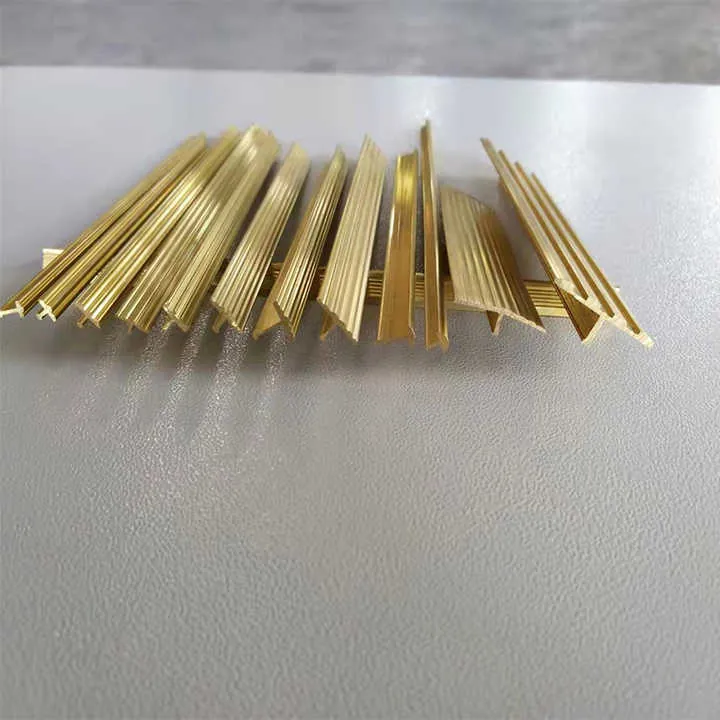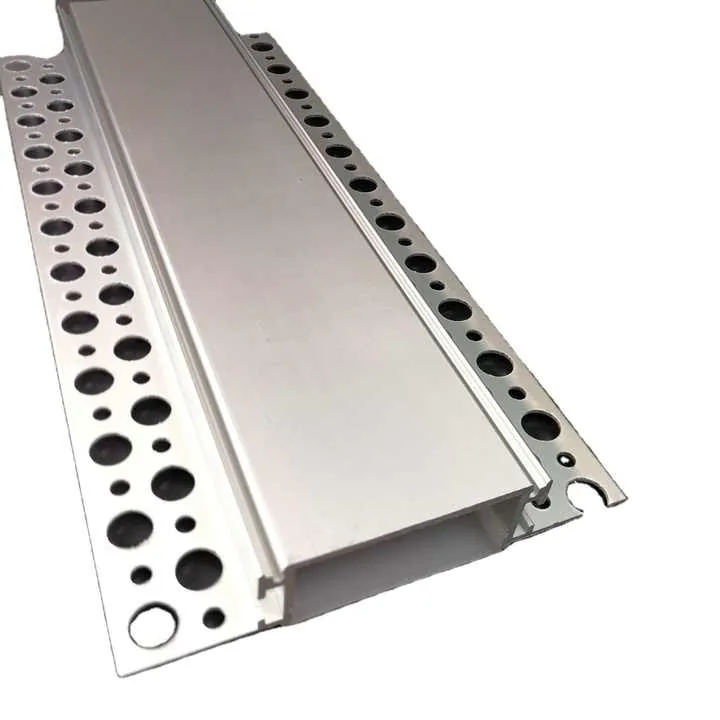Nejoblíbenější hliníkové podlahové lišty?

Many builders struggle to find a floor trim that is durable, easy to install, and stylish. Common materials often fail in one or more of these areas.
Aluminum floor trim strips are popular because they offer strength, clean design, and versatility for different flooring types, making them a reliable and widely used solution.
If you want a trim solution that lasts, blends in, and installs without a hassle, aluminum might be the answer. Let me walk you through why it’s a top pick.
What Makes Aluminum Floor Trim So Widely Used?
Too many floor trims crack, fade, or break with time. Plastic options may look cheap. Steel might rust. You need something better.
Aluminum is popular because it’s strong, rust-resistant, and easy to work with, while also offering a modern and clean look across all floor types.

Aluminum trims offer a smart balance of looks and performance. I’ve used them in commercial spaces, homes, and even outdoor patios. Here’s why I keep choosing them:
1. Durability
Aluminum doesn’t rust. It handles moisture better than steel. It won’t crack like PVC. That’s key in kitchens, bathrooms, or high-traffic zones.
2. Modern Look
Its clean metallic lines work with ceramic tiles, hardwood floors, or even vinyl. Plus, you can anodize or powder coat them in different finishes: matte, glossy, black, gold, and more.
3. Lightweight but Strong
Aluminum is easy to cut and move around on site. But once installed, it holds up against foot traffic, carts, and time.
4. Resistant to Heat and Chemicals
In factories or kitchens, aluminum doesn’t warp under heat or react to cleaning chemicals. That’s a win for long-term use.
5. Eco-Friendly
It’s recyclable, which matters more today than ever. Builders like to go green, and aluminum helps hit that mark.
Zde je rychlé srovnání:
| Funkce | Hliník | PVC | Ocel |
|---|---|---|---|
| Odolnost | Vynikající | Slabé | Silný |
| Vzhled | Moderní | Základní | Průmyslové |
| Odolnost proti korozi | Ano | Ano | Ne |
| Flexibilita | Mírná | Vysoká | Nízká |
| Náklady | Střední | Nízká | Vysoká |
| Cutting Ease | Easy | Velmi snadné | Obtížné |
| Hmotnost | Světlo | Světlo | Těžké |
Aluminum trim is resistant to rust, cracking, and heat, making it perfect for kitchens and bathrooms.Pravda
Aluminum handles moisture, heat, and chemicals better than PVC and steel.
Steel trims are lighter and easier to cut than aluminum ones.False
Steel is heavier and harder to cut, unlike aluminum which is lightweight and easy to handle.
What Sizes and Shapes Are Best for Different Floor Types?
Ever had a trim strip that didn’t match the floor height or left a weird gap? That’s why shape and size matter.
The right aluminum trim shape and size depends on the floor types you’re working with—like tile, wood, or laminate—and whether you’re covering edges, joints, or transitions.

Matching trim to floor type is essential. Here’s what I usually consider:
Common Shapes and Best Uses
| Typ tvaru | Případ použití |
|---|---|
| T-shape | Transitions between same-level floors |
| L-shape (angle) | Edge protection and stair nosing |
| U-shape (channel) | Holding glass panels or inserts |
| Ramp profile | Joining higher floors to lower ones |
| Flat profile | Decorative covers for seams or gaps |
Common Size Ranges
| Rozměr | Typický rozsah |
|---|---|
| Výška | 5mm to 25mm |
| Šířka | 10mm to 50mm |
| Délka | 2m to 3m per piece |
Before choosing, always measure the thickness of your flooring material. If you’re using adhesive, include that in your height estimate. Also consider expansion space if installing next to wood or laminate.
What Works for What
- Tile to Tile (same height): Use T-shape profiles.
- Tile to Carpet or Vinyl: Use ramp or flat profiles.
- Stairs or Exposed Edges: Use L-shaped or angle trims.
- Glass Panels: Use U-channel trims for secure holding.
A T-shaped aluminum trim is ideal for connecting floors of different heights.False
T-shaped trims are used when the floors are at the same height. For different heights, ramp profiles work better.
L-shaped trims offer good edge protection for stairs or tiles.Pravda
L-profiles are commonly used on stair edges or tile perimeters to protect and finish the edge.
How to Install Aluminum Floor Trim for a Seamless Look?
Ever installed a trim that ended up misaligned or popped out after weeks? Installation matters more than you think.
To install aluminum floor trim cleanly, you must measure accurately, cut properly, and secure it with the right adhesive or mechanical fixings based on the floor type.

Here’s how I do it every time for a clean and professional finish:
Průvodce krok za krokem
-
Measure the Length
Always measure the space carefully. Add a little extra for coverage if the walls or floor aren’t perfectly straight. -
Cut the Trim
Use a fine-tooth saw or metal-cutting blade. If cutting corners, use a 45-degree angle for a cleaner joint. -
Prepare the Surface
Remove dust, grease, or debris. A clean surface ensures stronger adhesion and longer life. -
Apply Adhesive or Fix Mechanically
Use high-strength adhesive for most situations. For stairs or heavy-traffic zones, screws or expansion plugs offer more security. -
Press and Align the Trim
Make sure the trim sits flush with the floor. If needed, use a rubber mallet to lightly tap it into position. -
Allow Time to Set
Let the adhesive cure for at least 24 hours before walking on it or installing other finishes.
Profesionální tipy
- Choose a trim color that closely matches or complements your floor.
- For tiles, install the trim before grouting to avoid gaps.
- Use masking tape on each side during glue-up to keep edges clean.
Aluminum trims should be installed only after the floor is fully set and grouted.False
For tiled floors, trims are often installed before grouting to ensure a cleaner finish and better alignment.
A fine-tooth blade is ideal for cutting aluminum trims smoothly.Pravda
Fine-tooth blades reduce burrs and give cleaner cuts on aluminum.
How Does Aluminum Trim Compare to PVC or Steel Options?
Maybe you’re weighing your options. Is aluminum really better than plastic or steel?
Aluminum floor trim provides a balance of durability, style, and workability that neither PVC nor steel can fully match, especially for mid- to high-end projects.

Let’s look at how each material stacks up:
| Funkce | Hliník | PVC | Ocel |
|---|---|---|---|
| Odolnost | Vynikající | Slabé | Silný |
| Vzhled | Moderní | Základní | Průmyslové |
| Odolnost proti korozi | Ano | Ano | Ne |
| Flexibilita | Mírná | Vysoká | Nízká |
| Náklady | Střední | Nízká | Vysoká |
| Cutting Ease | Easy | Velmi snadné | Obtížné |
| Hmotnost | Světlo | Světlo | Těžké |
My Take from the Field
- PVC: Good for temporary or budget installations. Easy to work with but doesn’t last under pressure.
- Steel: Very strong and suitable for industrial use. But it’s harder to cut and can rust if not treated.
- Hliník: Best for residential and commercial use. It’s clean-looking, easy to install, and performs well in most environments.
PVC floor trims are more durable than aluminum in high-traffic zones.False
PVC trims tend to crack or deform under heavy use, unlike aluminum which holds up well.
Aluminum trims are easier to cut and handle on-site than steel trims.Pravda
Aluminum is lighter and softer than steel, making it easier to cut and shape.
Závěr
Aluminum floor trims combine durability, clean design, and easy installation. Whether you’re working with tiles, wood, or vinyl, aluminum offers reliable performance and a polished finish that lasts.

 I feel that when decid](https://sinoextrud.com/wp-content/uploads/auto_1756203839_1.webp 1024w, https://sinoextrud.com/wp-content/uploads/auto_1756203839_1-768x768.webp 768w, data:image/webp;base64,UklGRm4AAABXRUJQVlA4IGIAAAAQAgCdASoMAAwAAQAaJZwCw7ELT8mHaVAAAP71B+5k9/8OIH4ljai97rwcFQdPt63h/dFxP826lG4t8v06aMcrTG3tJJQwoTgUvWYyxDaPWA9hETv9WrDiFuqjrDA77AAAAA== 12w, https://sinoextrud.com/wp-content/uploads/auto_1756203839_1-600x600.webp 600w)

